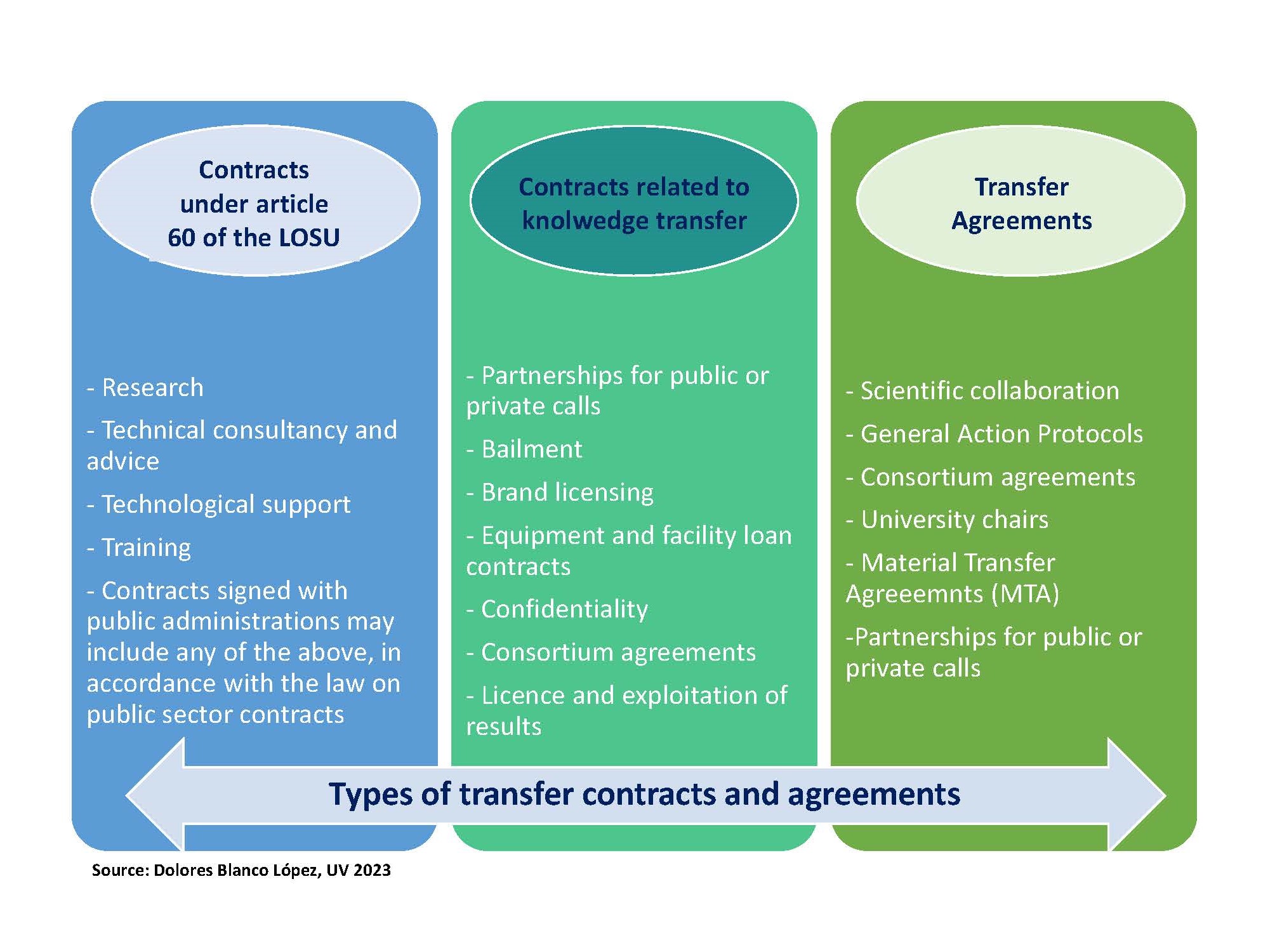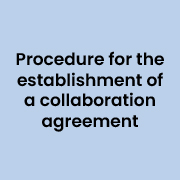There are different categories of knowledge transfer contracts and agreements, depending on their purpose and activities to be carried out:
The choice of contract depends on the work to be done:
- Research and development (R+D): These contracts involve a research project to be carried out by the UV at the request of a third party, in which a hypothesis is tested by means of experimentation, optimisation and development. The contracting entity makes the request on the basis of specific objectives with a work plan and defined economic conditions, a designated team of researchers and clauses that vary according to the type of project. These are contracts for work, resources or diligence, in which the research staff is not obliged to produce a result, since the achievement of a result depends on factors beyond their control. Rather, the main obligation of the contracted personnel is to carry out a specific activity, based on their scientific knowledge, acting with diligence and in good faith. This is of great importance when defining the rights, obligations and responsibilities of the contracting entity and the UV. For this reason, the clauses of the contract must be very clear and the technical report must detail the development of the work to be carried out and the possibility of “non-success”.
- Study development: The purpose of these contracts is the development of a research project based on scientific knowledge that broadens current knowledge in a determined area. Although these contracts share similarities with those of R+D+I, they differ significantly in their terms and conditions despite both being research contracts.
- Technological support and development: These contracts are designed for work that involves developing solutions for technical problems, implementing processes, or aiding in the creation of products based on the research team’s existing knowledge. The clauses regulate working conditions on the basis of know-how rather than research. Unlike R+D+I contracts, no new knowledge is generated, and there is no uncertainty or technical risk because these contracts are based on the application of pre-existing knowledge. Given that the outcome of this application may involve technological information or the technical development of prototypes or products, it is essential to establish beforehand that the issue at hand can be resolved with the existing knowledge.
- Conducting a clinical trial: This is a variation of a development contract that aims to advance the development of a new drug, clinical procedure or use of a new prosthesis. This type of contract is typically sought after by pharmaceutical companies or companies in the healthcare sector and the contracted university team usually consists of teaching and research staff in the healthcare field. These contracts involve complex negotiations and unique requirements due to the specific nature of the work to be performed. Approval from an Ethics Committee is required.
- Consultancy or advice: These contracts aim to provide solutions to problems based on scientific criteria, in which research personnel specialised in the field offer advice, opinions or diagnoses. They may be offered as one-time or recurring services of varying durations. These contracts cover a wide range of activities that do not generate new knowledge.
- Legal opinion: This is a special type of consultancy contract that involves a legal professional providing an opinion on a specific matter or fact at the request of a third party. The opinion must be specialised and precise.
Consultancy contracts can be closed or open. Closed contracts have a defined purpose, duration, price and timing of the service, while open contracts have a defined purpose and duration, but the timing and price of each task is undefined. The price and timing of each task in an open consultancy contract will depend on the services requested, but they will always be governed by the main contract.
- Contract training: This training is not considered a formal education since no official title is awarded. However, it offers limitless collaboration opportunities, including conferences, seminars or specialty courses custom-designed for the contracting entity or the individuals who requested them.
According to article 64.2 of the Organic Law on the University System (LOSU), civil servant staff of a university teaching body in active service and full-time contracted teaching and research staff of a public university are prohibited from teaching in private universities or private teaching centres attached to universities, with the exception of the abovementioned, non-regulated training. Similarly, they cannot supervise or tutor any Undergraduate or Master’s Degree Final Project at private universities. However, they may perform tutoring activities for online universities, public universities or universities partially funded by the Spanish autonomous regions and that adhere to public pricing.
- Curator contract: A curator designs and organises the production of an exhibition in its entirety, establishing the selection criteria for the works and objects to be included. These contracts allow for the organisation of a wide variety of activities related to research, counselling, publications and dissemination. These activities are not limited to the artistic sphere, as they can take on the form of scientific, photographic or documentary exhibits, among others.
- Contracts with public administrations: These can be minor contracts or public tenders in which universities are the contracted entity rather than the procuring entity. The UV may compete with other companies and professionals for tasks related to consultancy, training, studies, services, etc. These contracts are regulated by Law 9/2017 of 8 November on Public Sector Contracts and, although for universities this is a contract under article 60 of the LOSU, the requirements contained in the administrative specifications or in the requirements requested in the case of minor contracts must be taken into account in order to be able to obtain the contract.
- Order forms: If the subject of the work relates to services (analyses, measurements, calibrations, tests, etc.) with a low economic value of less than 12,000 euros, VAT included, with a short execution period (equal or less than one year), or of a highly technical nature which makes it unnecessary to draw up specific contractual clauses relating to confidentiality, industrial property, liability, etc., the commitment may be formalised by means of an order form. However, they must also be accompanied by the authorisation of the department, institute or ERI board and a financial and technical report.
These types of contracts are governed by the Regulation on the awarding of contracts for scientific, technological, humanistic or artistic activities and specific training (CG 11-VII-2022. Modified CG 2-VII-2024) (hereinafter referred to as ACGUV 172/2022).
The following types of agreements are excluded from the regulation (article 5):
- Collaboration agreements and general action protocols, which are excluded from the scope of article 60 of LOSU and which are available on another website
- External professional activities of part-time staff, as they are not subject to incompatibility
- Publishing contracts for the publication of their work or for the preparation of originals for publication, as they are not subject to incompatibility
- Training or specialisation programmes that are part of the academic offer of the UV, either as an official qualification or as a university qualification
- Training or specialisation programmes in the Spanish education system that lead to an official qualification with academic validity, as they are regulated teaching
- Awards obtained by UV staff individually or collectively, as they are not subject to incompatibility
- Attendance at conferences, symposia or seminars, within the limits set by the legislation in force, as they are not subject to incompatibility. They are considered as such when they involve less than 5 hours (art. 3 RD 1930/84)
- Research projects funded as a result of the UV’s participation in public R+D+I calls, whether regional, national, European, international or similar, which are governed by the specific rules of the call, as well as grants awarded directly
- Donations, sponsorship and patronage
- Contracts for gratuitous loan of UV equipment
- Co-authorship contracts and contracts for the joint exploitation of industrial and intellectual property rights, which are regulated in accordance with industrial and intellectual property laws
- Contracts for the transfer and licensing of industrial and intellectual property rights of the UV, subject to the provisions of articles 145, 206.2 and 219.1 of the UV Statutes and the laws on industrial and intellectual property
- Agreements for the creation of university chairs, which are governed by specific legislation, approved by the Governing Council
Organic Law 2/2023 of 22 March on the University System establishes the basis for developing knowledge transfer contracts. According to article 60, university staff may enter into such contracts.
Royal Decree 1930/1984 establishes basic state regulations that are binding and common to all universities. These regulations outline the criteria for granting compatibility and salary limits for teaching staff.
Article 60.2 of the LOSU stipulates that the governing bodies of the universities must regulate the procedures for authorising and concluding contracts. At the UV, this regulation is outlined in article 218 of the Statutes and its statutory development in ACGUV 172/2022.
Article 36 of Law 17/2022 of 5 September, which amends Law 14/2011 of 1 June on Science, Technology and Innovation (LCTI), states that private law, essentially civil law, applies to these contracts, subject to the principle of free will, which allows the contracting parties to agree freely, as long as they do not breach the mandatory rules that govern it.
Due to the diverse nature of these legal affairs, they are subject to a broad range of regulations. National and international civil and commercial legislation, as well as fields of law such as civil code, free competition, incompatibilities, industrial and intellectual property, tax legislation, labour law, data protection legislation, transparency, public sector contracts law, patronage/sponsorship and industrial secrets are all applicable.
Although private law applies in most cases, it is important to consider administrative law when concluding contracts with other public administrations, such as tenders and minor contracts, as these are regulated by Law 30/2007 of 30 October on Public Sector Contracts. In this case, the UV, as a contracted entity, must follow the public procurement guidelines established by the other administration. It must comply with all mandatory administrative and technical specifications.
Article 60 contracts are atypical civil contracts that are negotiated and onerous and are either bilateral or multilateral. Contracts are drawn up on the basis of existing legal models or schemes, with additional clauses added to serve the indended purpose of the contract and reflect the will of the parties involved. The clauses established by the parties are decisive, and in cases where they are not specified, customary practices and laws, as well as good faith, will apply.
Article 60 of the LOSU (previously article 45.1 of the LRU and article 83 of the LOU) aims to eliminate the incompatibility of university professors, as established in Law 53/1984 of 26 December on Incompatibilities of Staff in the service of Public Administrations, from carrying out research consultancy and training work for third parties while also fulfilling their own duties, regardless of their contract time commitment.
However, teaching and research staff cannot sign a contract at their own risk without the prior approval and authorisation of the UV. Failure to follow the UV’s procedures concerning this type of activity would breach the incompatibility regime. Additionally, any contract signed without following these procedures would be invalid and ineffective, rendering it null and void.
According to Royal Decree 1930/1984, university professors can only be considered compatible if their contract has been authorised in accordance with the procedure established in the Statutes of each university. This regulation also sets limits on the maximum percentage that can be charged for each contract and the maximum annual amount that can be received.
At the UV this compatibility is regulated by articles 218 and 221of the UV Statutes and ACGUV 172/2022. To obtain compatibility at the UV, it is essential to secure the prior and express agreement of the relevant Department, ERI or Institute, regardless of who signs the contract (e.g. the Principal or delegated individual, or the heads of the departments, ERIS or institutes).
Article 19 of ACGUV 172/2022 lists the cases in which compatibility may be denied.
There is no need for compatibility (i.e. an article 60 contract) in the following situations.
- Conducting seminars or giving courses or lectures in official centres for the training of civil servants or teaching staff, provided that such activities are not permanent or regular in nature and do not exceed 75 hours per year. This exemption also applies to preparation for access to the civil service
- Occasional collaboration and attendance at professional congresses, seminars, conferences or courses lasting less than 5 hours
- Occasional participation in colloquiums and media programmes
- Participation in selection boards for selective tests for admission to the Public Administration or in examinations, tests or assessments other than those to which they are typically assigned
- Holding of the position of President, Chairperson or Member of the Governing Boards of Civil Servants’ Mutual Societies or Boards of Trustees of Civil Servants
- Literary, artistic, scientific and technical production and creation, as well as derivative publications, provided that they do not originate from an employment or service relationship (e.g. under a previously signed article 60 contract)
Occasional participation in a course should be limited to specific interventions, rather than teaching in a course lasting several months or participating in several consecutive courses.
According to Article 8 of ACGUV 172/2022, PDI doctoral staff who are currently in active service may be appointed as the person responsible for the contract (PI). Temporarily contracted staff must have a formal contractual relationship with the UV at the time of signing the contract, with an expected duration equal to or greater than that of the contract execution.
A contract can have a maximum of two individuals responsible, but only one of them will act as the point of contact with the UV for all contract management matters. The technical report must specify the person who will act as the point of contact and, if applicable, a secondary person.
The individuals responsible will manage the research project, assign tasks to team members and represent the group. It is the responsibility of these individuals to ensure strict compliance with the contract, including the obligations of each member and any other conditions outlined in the contract and technical report.
They must also provide any information and documents requested by the University Head Office and other management services for any monitoring, control and accountability operations that may be conducted.
For more information, please consult the guide on participating in scientific, technological, humanistic or artistic contracts, as well as specific training activities.
According to article 22 of ACGUV 172/2022, knowledge transfer contracts must be signed by the Principal of the UV or their delegate, or by the heads of departments, university research institutes or Interdisciplinary Research Structures (ERIs).
The teaching and research staff in charge of the future contract should contact the Contracted R+D+I Section for guidance on drafting the technical report, preparing the budget, participating in the contract, etc.
For instructions on how to initiate the contract processing procedure, please refer to the following link.
Once the documents have been submitted, the Contracted R+D+I Section will either draft the most suitable contract model for the research activities, or review the draft proposed by the other party. This will initiate a negotiation process, which will conclude when all parties agree on the terms of the contract.
Once this phase is complete, the document must be signed. For legal reasons, contracts cannot contain both handwritten signatures and electronic or scanned signatures at the same time.
Once signed, the contract is registered and an activity specific accounting code is assigned. This code will be used to pay the invoices from the contracting institution to the teaching and research staff responsible for carrying out the activities specified in the contract.
This accounting code is specific to the activity detailed in the contract and will be closed once the contract expires. The contract is considered effectively terminated when the conditions for termination or withdrawal have been met and all expected income has been received. Within six months of termination, all outstanding expenses, including additional allowances or extraordinary bonuses assigned to participating personnel, must be accounted for.
Amendments may be signed during the contract period to modify certain conditions, such as activities, budget and duration.
If the activities outlined in the contract have not been completed, or if reports or deliverables are still outstanding, it is highly recommended to extend the contract.





















